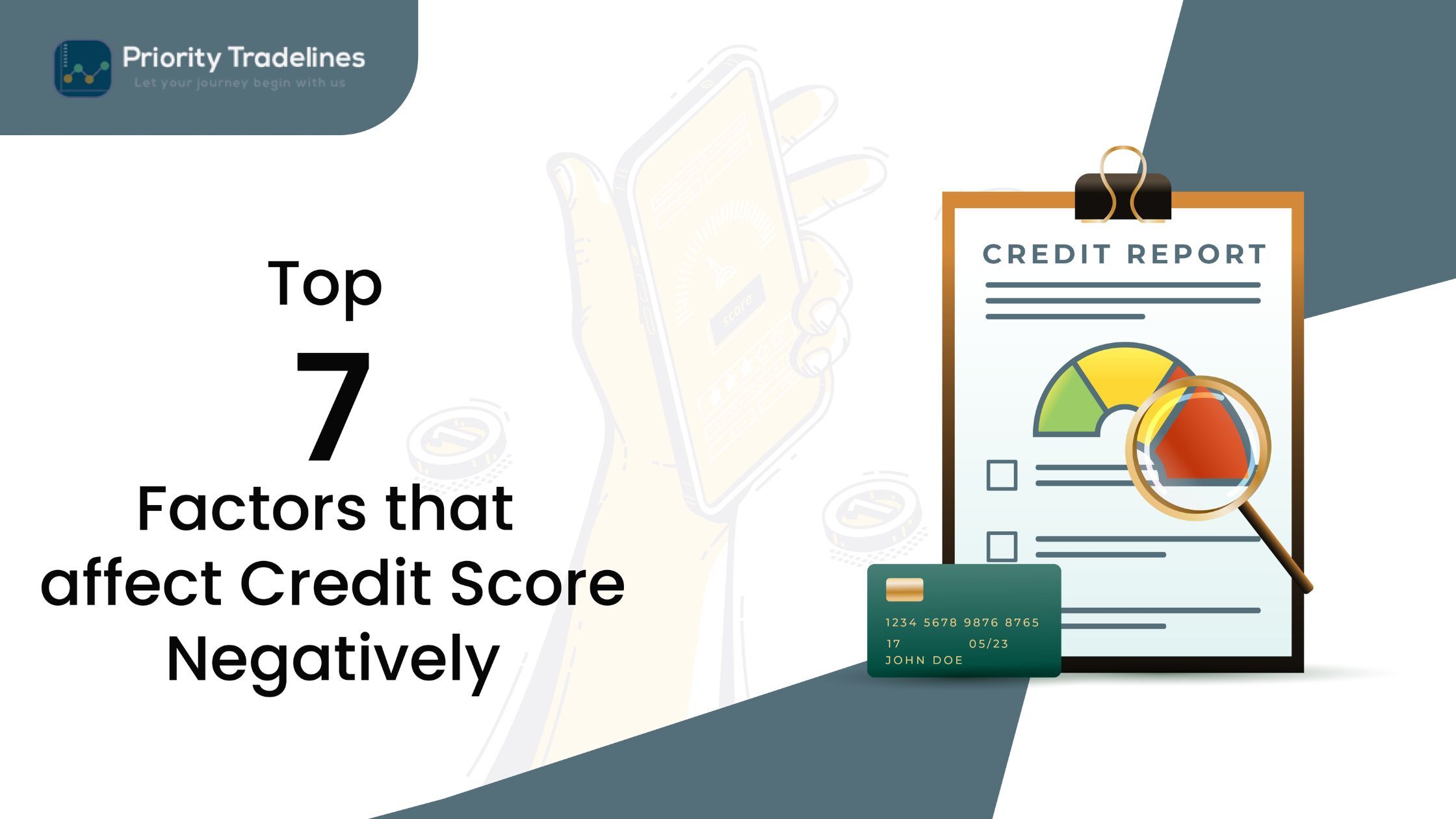One of the most critical elements of your financial well-being is your credit score. Loans, the best credit cards, and even lower rates on auto and homeowner's insurance are all within reach of those with solid credit. It also facilitates the rental of housing and the hiring process for specific positions.
Paying your bills on time and keeping your balances low are tried and true methods of preventing damage to your credit score, which you likely already know. However, there may be other things you aren't aware of that can impact your credit score. You'll find seven of them below.
7 Factors that affect Credit Scores Negatively
Let's back up for a second and talk about the significance of credit scores and what they are. Potential lenders use credit scores as a quick and easy way to gauge the debtor's total credit risk. A borrower's ability to repay a loan or the probability of default are both estimated using financial data from the past. The application might be denied if an applicant has a low credit score. It may prevent you from qualifying for the most affordable products altogether.
The most up-to-date information from Equifax, a global consumer credit reporting company, shows how an unyielding credit score can be. According to Equifax, the typical British person's credit score is 380. Even though it's in the "good" range, it's only one point above the "poor" range of 280-379. So while a perfect score would be 700, it's safe to assume that most borrowers aren't as honest as they appear.
Some of the most frequent causes of credit score changes are as follows:
Payment history
One of the easiest strategies to increase your credit score is to pay your credit card bills on time every month. Lenders will see you as a responsible borrower even if you just pay the bare minimum each month. Additionally, it displays your ability to repay a debt over an extended period. Your credit report may reflect late or missed payments for up to three years. This is why it's crucial to avoid falling behind on your payments.
Hard credit inquiries
Hard credit checks are extensive investigations into a person's credit history performed by legitimate financial firms. In the loan industry, they are utilised to aid in the decision-making process. For example, a hard search may be performed when asking for a significant loan, like a mortgage, credit card, or vehicle loan.
In contrast to the minimal impact of a single hard inquiry on your credit score, repeated inquiries into your financial history can have a negative impact on your credit and paint you as a riskier consumer. As a result of submitting so many applications, we have reason to believe you regularly have a financial shortfall. It may also suggest that you have a careless outlook on debt. A hard inquiry will remain on your credit record for up to two years. So before giving the go-light for a complete application, ensure you need one.
Being registered to vote
Using the voter registration list is a simple and quick way for lenders to confirm your personal information. Lenders can further safeguard themselves from fraud by gaining access to government-certified information. Your credit score may drop by as much as 50 points if you don't register or keep your information up to date. There may be far-reaching consequences for financial software as a result of this.
Mobile phone contracts
Contracts for mobile phones may seem like a trivial investment, but they have a sizable effect on your credit rating. Keeping up with your phone bill payments is a great strategy to boost your credit rating, like credit card payments. Indicating to lenders that you can stick to a regular payment schedule will help you get better terms.
Finances of a partner
Your credit score may include your spouse's or long-term partner's income if you are married or in a long-term relationship. Combining forces can sometimes help your application succeed. For example, if your partner has a "thin" credit history, you may want to separate your finances from theirs.
Borrowing percentages
Excellent credit history can be built with the use of credit cards. However, applying for a job while carrying a balance on your credit card is not a good idea. Keeping your credit card debt at or below 25% is a good rule of thumb unless you can pay off your monthly balance. This demonstrates to lenders that you are mature and honest about your financial situation and ability to repay loans.
Ignoring your credit score
Checking your credit report won't have any immediate effect on your score. However, if you don't check your credit reports often, you can be unaware of an issue that negatively affects your score.
If someone were to steal your identity and use it to open a credit card in your name, that account would be included on your credit report. In addition, credit can take a hit if you let the bill go unpaid and the account becomes late. You can dispute and remove fraudulent accounts, but you need to be aware of their presence before you can begin the cleanup process on your own.
The same is true of credit report mistakes. Lenders occasionally make mistakes when reporting your account status, but it does happen. Any of these mistakes might potentially lower your credit score.
Cosigning Loans
Cosigning a loan for a friend or family member is a selfless gesture because it increases their chances of getting approved for a loan. But, to be clear, a cosigner's role is more than only to help a borrower get a loan by vouching for them financially in the event of default.
Both borrowers' credit scores will take a hit if payments are late on a loan for which they cosigned. Additionally, the debt will appear on your credit report, which could boost your debt-to-income ratio and make it harder to obtain credit approval when needed.
Conclusion
The more effort you put into establishing solid credit habits at the outset, the easier it will be to build and keep a high score throughout your life. In addition, checking your credit score frequently might help you prevent actions that can lower it.
By checking your credit report often, you can catch problems before they become serious and learn what you can do to raise your score.



